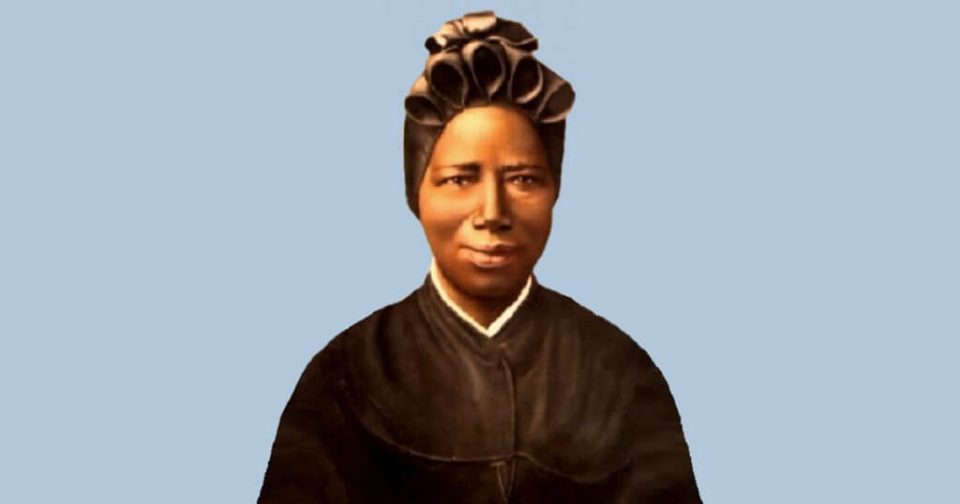Life of Saints: Saint Josephine Bakhita

8 February -
Optional commemorative liturgical color: White (purple if the day of the Lenten week)
Patron of Sudan and survivors of human trafficking
A slave comes from Africa to freely serve the Master of all
Black on black or Arab on black slavery normally preceded and made possible the white on black slavery practiced by the colonial powers. These powers - England, France, Spain, Portugal, Italy - were not slave societies, but their colonies were. The complex pancreatic reality of the slave trade and of slavery itself was on full display in the dramatic first life of today's saint. The future Josephine was born in western Sudan, centuries after the Church and most Catholic nations had long banned slavery. Applying those teachings and laws was infinitely more difficult, however, than issuing them. And so it happened that an African girl was kidnapped by Arab slave traders, forced to walk six hundred miles barefoot and sold and resold in local slave markets for a period of twelve years. She was forcibly converted from her native religion to Islam, was cruelly treated by one master after another, was whipped, tattooed, scarred and beaten. After experiencing all the humiliations inherent in captivity, she was purchased by an Italian diplomat. She had been too young, and had been too long, so she didn't know her name and had unclear memories of where her family would be. Basically, she had no people. The slave traders had given her the Arabic name Bakhita, "The lucky one", and the name remained. so he didn't know his name and had unclear memories of where his family would be. Basically, she had no people. The slave traders had given her the Arabic name Bakhita, "The Fortunate", and the name remained. so he didn't know his name and had unclear memories of where his family would be. Basically, she had no people. The slave traders had given her the Arabic name Bakhita, "The Fortunate", and the name remained.
Living in limited freedom as a servant with her new family, Bakhita first learned what it meant to be treated like a child of God. No chains, no eyelashes, no threats, no hunger. She was surrounded by the love and warmth of normal family life. When his new family was returning to Italy, he asked to accompany them, thus beginning the long second half of his life story. Bakhita settled with a different family near Venice and became the nanny for their daughter. When the parents had to deal with foreign affairs, Bakhita and her daughter were entrusted to the care of the nuns of a local convent. Bakhita was so constructed by the example of the nuns of prayer and charity that when her family returned to take her home, she refused to leave the convent, a decision reaffirmed by an Italian court that determined that she was never legally enslaved. Bakhita was now absolutely free. "Freedom from" exists to make "freedom for" possible, and once free from obligations to her family, Bakhita chose to be free for service to God and his religious order. He freely chose poverty, chastity and obedience. She freely chose not to be free.
Bakhita took the name of Josephine and was baptized, confirmed and received the first holy communion on the same day by the cardinal patriarch of Venice, Giuseppe Sarto, the future pope Saint Pius X. The same future saint received religious vows a few years later. The saints know the saints. The trajectory of Sister Josephine's life was now resolved. She would remain a nun until her death. Throughout her life, Sister Josephine often kissed the baptismal font, grateful that in her holy water she became the daughter of God. Her religious duties were humble: cooking, sewing and greeting visitors. For a few years he traveled to other communities of his order to share his extraordinary story and prepare the younger sisters for service in Africa. A nun commented that "her mind was always on God, but her heart in Africa". Her humility, sweetness, and simple joy was contagious, and she became famous for her closeness to God. After heroically resisting a painful disease, she died with the words "Madonna, Madonna" on her lips. Her trial began in 1959 and was canonized by Pope St. John Paul II in 2000.
Saint Josephine, you lost your freedom as a young man and you gave it as an adult, showing that freedom is not the goal but the path to serve the Master of all. From your place in heaven, give hope to those who resist the indignation of physical slavery and those closely linked by other chains.